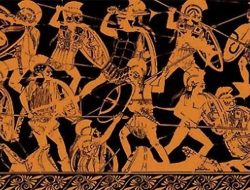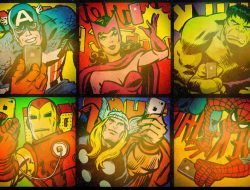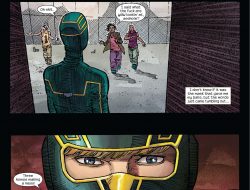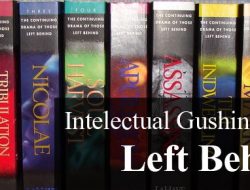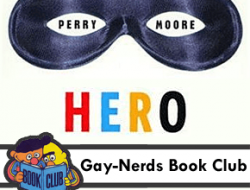Click on through for some spoileriffic snippets from the forum discussion on The Unbearable Lightness of Being.
BubbleBobbleBoy:
What really intrigued me about this novel was the duality in his stance on humanity. (Wo)man has the capacity to construct and mold his or her life into whatever they wish (a necessary component on Parmenides’ dichotomous world). Yet, we all know that humans are not infallible, which, in conjunction to the inexorable finality of life, makes each of these choices extremely meaningful. For example, Tomas making the biblical connection to Teresa arriving in a metaphorical bullrush basket or Teresa’s acknowledgment of Oedipus sitting on the bookshelf. These events, or objects inherently have no meaning; the individual imparts the symbolism and significance and therefore is a complete master over his/her fate. Yet, that means that there is a staggering amount of responsibility invested in finding or highlighting these self-created fortuitous moments and making life choices that cannot be altered.
parchita:
One of the interesting things about this book, however, is the fact that I didn’t really relate to any one of the main characters, yet saw myself in all of them. It was such a fascinating thing to me, understanding Tereza’s pain and yet agreeing with Tomas’s views on sex. I don’t know that I would have behaved like either of them, but I certainly understood why each of them behaved the way that they did.
noteDhero:
I found the ending to be somewhat bitter. We’re told of Tomas and Tereza’s deaths in the middle of the novel, but when we reach the night before their death, I don’t think we’re given any real sense of finality in the story. Almost like the novel loops itself in the idyllic circle that Kundera himself says is a lingering impossibility. So it’s something that will probably nag at me for a while, and also be the first thing I think of every time the book is mentioned.
I don’t know. I was enchanted with this book in a way that I don’t think I have been in a very long time, but the feelings I’m left with are totally new, and I don’t have a word for them yet. If I were less of a robot, I’d probably have an answer. Regardless, this book could only be written by someone who knows himself well. He has such a mastery of his own thoughts and feelings that he’s able to create something so complex and identifiable with few words. I envy that.
GN Rating: 4 out of 5
Read the rest of the discussion here.
April’s book is American Gods by Neil Gaiman. The discussion will (hopefully) start on the 20th.
From Amazon.com:
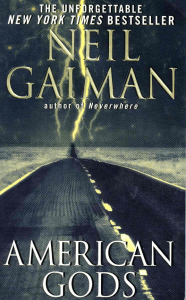 “Shadow gets out of prison early when his wife is killed in a car crash. At a loss, he takes up with a mysterious character called Wednesday, who is much more than he appears. In fact, Wednesday is an old god, once known as Odin the All-father, who is roaming America rounding up his forgotten fellows in preparation for an epic battle against the upstart deities of the Internet, credit cards, television, and all that is wired. Shadow agrees to help Wednesday, and they whirl through a psycho-spiritual storm that becomes all too real in its manifestations. For instance, Shadow’s dead wife Laura keeps showing up, and not just as a ghost–the difficulty of their continuing relationship is by turns grim and darkly funny, just like the rest of the book.”
“Shadow gets out of prison early when his wife is killed in a car crash. At a loss, he takes up with a mysterious character called Wednesday, who is much more than he appears. In fact, Wednesday is an old god, once known as Odin the All-father, who is roaming America rounding up his forgotten fellows in preparation for an epic battle against the upstart deities of the Internet, credit cards, television, and all that is wired. Shadow agrees to help Wednesday, and they whirl through a psycho-spiritual storm that becomes all too real in its manifestations. For instance, Shadow’s dead wife Laura keeps showing up, and not just as a ghost–the difficulty of their continuing relationship is by turns grim and darkly funny, just like the rest of the book.”
We’re also mixing things up with the book club selection and how books are nominated. Details here. We’ve also got the next six books already picked out:
May— The Immortal Life of Henrietta Lacks
June—Snowcrash
July—Squirrel Seeks Chipmunk: A Modest Bestiary
August—Zombie Spaceship Wasteland: A Book by Patton Oswalt
September—Sing You Home: A Novel
October—Something Like Summer
Tags: American Gods, gn book club, kundera, The Unbearable Lightness of Being

